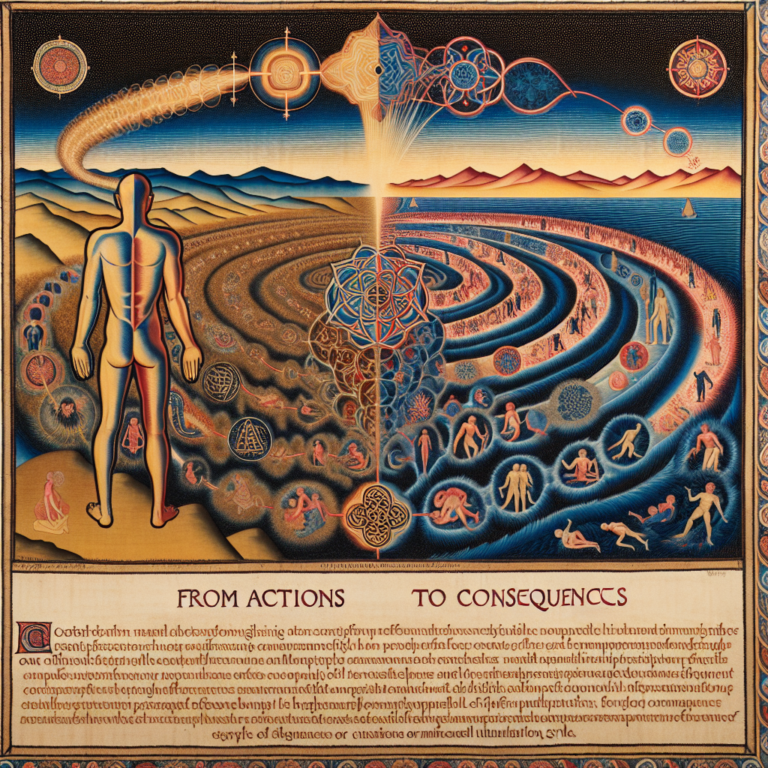Karma is a term widely coined in modern culture, often associated with the concept of moral cause and effect. It suggests that good deeds lead to positive outcomes while wrongdoing results in negative consequences. However, as with many philosophical concepts, the popular understanding of karma can be quite skewed. This article aims to dissect the myths surrounding karma, presenting a clearer understanding of its origins, meanings, and implications in our daily lives.
What Is Karma?
The word "karma" originates from the ancient Indian language of Sanskrit, meaning "action" or "deed." In its philosophical roots, particularly within Hinduism and Buddhism, karma refers to the spiritual principle of cause and effect, where every action has corresponding repercussions. However, this does not simply imply a system of rewards and punishments; karma encompasses much more than that. It is tied to the intention behind an action, the context in which it occurs, and the accumulated effects across lifetimes.
Common Myths About Karma
Myth 1: Karma Is a Retributive Justice System
Many people view karma as a form of cosmic justice—an immediate payback system for one’s actions. This perspective implies that when someone commits a wrongdoing, they will swiftly encounter an equal consequence. However, karma operates in much more complex ways. The effects of one’s actions may not unfold in a linear, immediate fashion; they can manifest in future experiences, often transcending a single lifetime. This delay can lead to disillusionment about the idea of justice if one expects quick retribution.
Myth 2: All Good Actions Lead to Good Outcomes
Another common misconception is the belief that every good deed automatically results in a positive outcome. While good actions can cultivate positive karma, this does not guarantee that the individual will experience immediate positivity in return. The outcomes depend heavily on various factors, including the intention behind the action, the broader context, and individual circumstances. Moreover, the complexity of life’s web of interactions means that good actions may not always lead to straightforward rewards.
Myth 3: Karma Only Applies to Others
It’s easy to think of karma as something that applies to other people. Many individuals comfortable with the idea of karma might observe their peers receiving unpleasant consequences for negative actions while believing that their own misdeeds will not attract any repercussions. This paradox undermines the fundamental essence of karma, which emphasizes personal accountability. Karma operates within the framework of one’s collective actions—everyone is affected by their own karma.
Myth 4: Instant Karma Is Real
The concept of "instant karma," popularized by phrases like “what goes around comes around," suggests that the universe will promptly deliver consequences for one’s deeds. While it’s an enticing idea, it is more myth than reality. The influence of karma evolves across time, contexts, and personal circumstances. Neither immediate retribution nor poetic justice is guaranteed. While one might witness actions leading to swift outcomes, this is not necessarily a universal rule of karma.
Myth 5: Karma Is Fatalistic
Some interpret karma as a form of fatalism, suggesting that individuals are bound to their past actions with no means of altering their fate. This viewpoint fails to recognize the transformative power of awareness and change. While past actions shape an individual’s present circumstances, they do not predetermine every future outcome. People can cultivate positive karma through conscious decision-making and self-reflection, ultimately breaking free from negative cycles.
The Importance of Intention in Karma
At the heart of karma lies the significance of intention. Actions motivated by genuine goodwill, compassion, or altruism carry a different weight than those rooted in selfish ambitions or malice. The nuanced understanding of karma emphasizes that the quality of intention shapes the results of our actions.
When individuals act with pure intent, the positive energies cultivated can ripple outwards, leading to favorable conditions in life. Conversely, actions steeped in negative intentions can foster internal turmoil and manifest as adverse outcomes. The interplay between action and intention ultimately reflects the complex fabric of karmic consequences.
How Can Understanding Karma Transform Lives?
Recognizing the intricacies of karma can lead to a more profound understanding of responsibility and interconnectedness. By acknowledging that our actions—good or bad—carry weight beyond immediate consequences, individuals can foster a greater sense of accountability in their lives. This awareness can encourage altruistic behavior, promote empathy toward others, and cultivate a proactive approach to growth and transformation.
Seeing karma as a guide for moral living rather than a punitive measure can foster resilience and acceptance. It encourages individuals to learn from their experiences and to harness the lessons of the past, rather than being trapped by them. The understanding that one can influence their karma through conscious and compassionate choices can lead to personal and societal transformation.
Conclusion
The concept of karma is rich and multifaceted, extending beyond popular myths and common misconceptions. By dissecting these myths, we learn that karma is not a straightforward system of rewards and retribution; rather, it is an intricate web of actions, intentions, and consequences that shape our lives over time. Understanding karma in its true context invites greater accountability, empathy, and an opportunity for transformation. Instead of fearing karma or seeing it as a means of punishment, we can embrace it as a guiding principle for a more compassionate and conscientious existence.
FAQs
1. What is the true meaning of karma?
Karma fundamentally refers to the principle of cause and effect, focusing on the actions one takes and the intentions behind them. It is not merely about rewards and punishments but rather how our actions shape our experiences over time.
2. Does karma apply to everyone?
Yes, karma applies to everyone. All individuals are subject to their own karmic consequences based on their actions, intentions, and choices.
3. Can you change your karma?
Yes! While past actions influence present circumstances, individuals have the power to change their karma through conscious choices and positive actions in the present.
4. How long does it take for karma to manifest?
The manifestation of karma can vary widely; it may occur immediately, in the near term, or even over an extended period, including across multiple lifetimes. Each person’s karmic journey is unique.
5. Is karma only about personal actions?
While personal actions play a significant role in karma, it also encompasses the interconnected relationships and collective actions within communities and society at large. Our actions impact not just ourselves but the broader world around us.
It seems you might have meant to ask for a specific prompt or topic. Could you please provide more details or specify what kind of prompt you are looking for? Whether it’s for writing, creativity, brainstorming, or something else, I’d be happy to help!, #Debunking #Karma #Separating #Fact #Fiction #Popular #Myths, #Debunking #Karma #Separating #Fact #Fiction #Popular #Myths, 1734917296, debunking-karma-separating-fact-from-fiction-in-popular-myths





